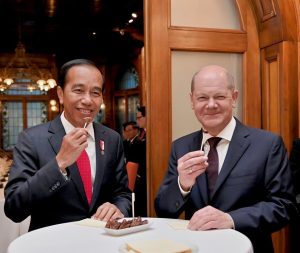German Chancellor Olaf Scholz said yesterday that he will press for a trade agreement between the European Union and Indonesia, as part of his country’s goal of lessening its economic reliance on China, particularly for crucial raw materials.
Speaking at the opening of the annual Hannover trade fair, of which Indonesia is this year’s partner, Scholz told visiting Indonesian President Joko “Jokowi” Widodo that he was “working to finally get this agreement across the finish line,” according to The Associated Press.
The EU and Indonesia officially launched negotiations for a free trade agreement (FTA) in July 2016, but these have stumbled over disagreements about Jakarta’s protectionism and the European bloc’s policies toward palm oil, a key Indonesian export. The 11th and most recent round of negotiations concluded in November 2021.
Still, the EU’s desire for an Indonesian FTA is becoming more ardent amid Brussels’ recent determination to boost its “strategic engagement” with the Indo-Pacific region, in response to the increasing strategic tension both in Europe and Asia. In Southeast Asia, the EU has already concluded free trade pacts with Singapore and Vietnam, which entered into force in November 2019 and August 2020, respectively. The bloc is also in stagnant negotiations with Thailand, Malaysia, and the Philippines. As the European bloc has put it, “The ultimate objective is for bilateral trade agreements with individual ASEAN countries to serve as building blocks towards a future region-to-region agreement between the EU and ASEAN.”
This dovetails with the strategic goals of a number of individual EU member states, whose strong economic links with China have recently become the subject of growing scrutiny, particularly since the Russian invasion of Ukraine in February 2022. none more so than Germany. As Scholz said yesterday, his country is concerned about becoming too reliant on China, including for crucial minerals and compounds needed for digital technology and renewable energy generation.
“At the moment we import many of them from China. And that’s despite the fact that rare earth, copper or nickel are often not extracted there but in countries such as Indonesia, Chile, or Namibia,” Scholz said. “We want to change that.”
Interestingly, Scholz added that any new trade deal should prioritize the construction of processing facilities for such raw materials in the countries where they are found, which he said would benefit the local economy. This last reference hinted at one of the key points of tension in the relationship between Indonesia and the EU – and one of the main issues holding up the progress on an FTA.
Over the past few years, Jokowi has introduced a number of measures to ensure that his country derives the maximum benefit from its rich concentrations of important minerals. At the start of 2020, his administration banned the export of unprocessed nickel – Indonesia is a major source of the crucial mineral – and introduced domestic processing requirements that have required businesses to process or purify the raw materials in Indonesia before export. Late last year, he announced that the country will similarly ban exports of bauxite starting this June, and has also flagged possible future bans on the export of unprocessed tin and copper.
As James Guild wrote in these pages late last year, these moves have reflected Indonesia’s tendency to resort to economic nationalism when it is viewed as being in the national interest. The nickel ban in particular was “an attempt to force more investment in higher value-added downstream activities like smelting, and eventually battery and EV manufacturing.”
As mentioned, these policies have courted tensions with the EU. In late 2019, Brussels challenged the nickel export ban policy at the World Trade Organization, which last year ruled in its favor, arguing that the policy was contrary to global trade rules. Indonesia quickly announced that it would appeal the ruling, with Jokowi channeling his inner Sukarno in defense of his policy: “If we are scared of being sued, and we step back,” he said, “we will not be a developed country.”
The fact that Scholz so explicitly cited domestic mineral processing as an important part of any future EU-Indonesia FTA suggests one of two things: either that Brussels is willing to come to terms with Jakarta on this issue, or that Berlin is willing to put pressure on the EU to this end.
Certainly, the EU does seem to face a number of trade-offs in its desire for “strategic engagement” with the Indo-Pacific in general and Southeast Asia in particular. For instance, the FTA with Vietnam has involved a de facto dilution of Brussels’ values-based foreign policy. Meanwhile, the EU’s policies aimed at fighting deforestation have courted friction with Indonesia and Malaysia, the world’s two largest producers of palm oil.
Given the extent to which rival powers (i.e. China) have engaged Southeast Asia nations economically, with few compunctions about these nations’ “internal affairs,” suggests that the EU’s growing engagement with the region will require a number of compromises. Exactly where and how the EU chooses to compromise bears close watching.













